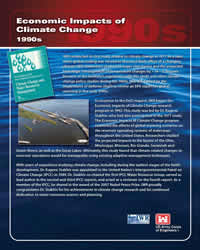 IWR conducted its first study related to climate change in 1977. At a time when global cooling was viewed as the most likely effect of a changing climate, IWR researchers studied 18 major river basins and the projected hydrologic consequences of temperature changes by + or – 2 degrees. Because of the Institute's experience with this study and other climate change policy studies during the 1980s, IWR was tasked by the Department of Defense (DoD) to review an EPA report on global warming in the early 1990s.
IWR conducted its first study related to climate change in 1977. At a time when global cooling was viewed as the most likely effect of a changing climate, IWR researchers studied 18 major river basins and the projected hydrologic consequences of temperature changes by + or – 2 degrees. Because of the Institute's experience with this study and other climate change policy studies during the 1980s, IWR was tasked by the Department of Defense (DoD) to review an EPA report on global warming in the early 1990s.
In response to the DoD request, IWR began the Economic Impacts of Climate Change research program in 1992. This study was led by Dr. Eugene Stakhiv, who had also participated in the 1977 study. The Economic Impacts of Climate Change program examined the effects of global warming scenarios on the reservoir operating systems of waterways throughout the United States. Researchers studied the projected impacts to the basins of the Ohio, Mississippi, Missouri, Rio Grande, Savannah and Green Rivers, as well as the Great Lakes. Ultimately, this study found that climate-related changes to reservoir operations would be manageable using existing adaptive management techniques.
With years of experience studying climate change, including during the earliest stages of the field’s development, Dr. Eugene Stakhiv was appointed to the United Nation's Intergovernmental Panel on Climate Change (IPCC) in 1989. Dr. Stakhiv co-chaired the first IPCC Water Resource Group, served as lead author in the second and third IPCC reports, and acted as a reviewer on the fourth report. As a member of the IPCC, he shared in the award of the 2007 Nobel Peace Prize. IWR proudly congratulates Dr. Stakhiv for his achievements in climate change research and his continued dedication to water resources science and planning.
Learn more: